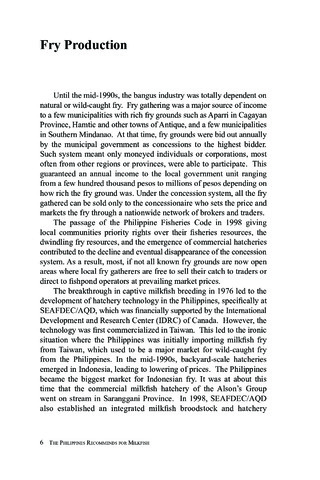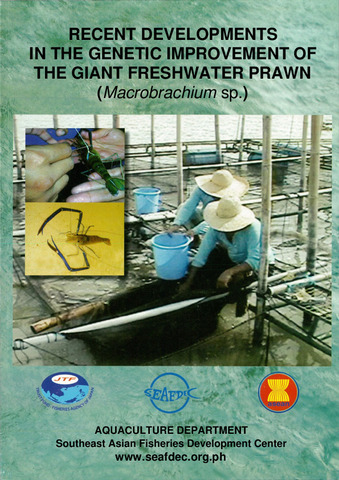Genetic changes during mass selection for growth in Nile tilapia, Oreochromis niloticus (L.), assessed by microsatellites
| dc.contributor.author | Romana-Eguia, Maria Rowena R. | |
| dc.contributor.author | Ikeda, Minoru | |
| dc.contributor.author | Basiao, Zubaida U. | |
| dc.contributor.author | Taniguchi, Nobuhiko | |
| dc.date.accessioned | 2014-05-13T07:02:47Z | |
| dc.date.available | 2014-05-13T07:02:47Z | |
| dc.date.issued | 2005 | |
| dc.identifier.citation | Romana-Eguia, M. R. R., Ikeda, M., Basiao, Z. U., & Taniguchi, N. (2005). Genetic changes during mass selection for growth in Nile tilapia, Oreochromis niloticus (L.), assessed by microsatellites. Aquaculture Research, 36(1), 69-78. | en |
| dc.identifier.issn | 1355-557X | |
| dc.identifier.uri | http://hdl.handle.net/10862/2039 | |
| dc.description.abstract | Two control (C1 or first control generation, and C4 or fourth control generation) and three selected (S1 or first selected generation, S2 or second selected generation, S4 or fourth selected generation) stocks of Chitralada Nile tilapia were analysed for microsatellite variation to determine the effect of size-specific mass selection on genetic variability. Genetic variation based on five microsatellite loci (UNH123, UNH147, UNH172, UNH222 and UNH216) showed a slightly higher allelic diversity in the selected stocks (7.4–10 alleles) than in the control stocks (6.8–8.8 alleles). Apparent reductions in the mean number of alleles and He values were noted in successive generations of both control and selected lines. Significant deviations from Hardy–Weinberg equilibrium because of an excess of homozygotes indicated inbreeding in all control and selected stocks. Although estimated inbreeding levels were not significantly different among selected and control lines based on Welch's t-tests, the increase in the degree of inbreeding within the selected line was higher (107.9%) than the control line (64.2%) after four generations. The implications of these results on the management and conservation of genetic diversity in improved breeds are discussed, while the importance of monitoring and minimizing inbreeding are likewise emphasized. | en |
| dc.description.sponsorship | The authors would like to thank Ms. Adelaida L Arago, Messrs. Bienvenido Banaag and Federico Reyes for their technical assistance. The Japan Society for the Promotion of Science (JSPS) and SEAFDEC are gratefully acknowledged for funding this study. | en |
| dc.language.iso | en | en |
| dc.publisher | Blackwell Publishing | en |
| dc.subject | Oreochromis niloticus | en |
| dc.subject | mass selection | en |
| dc.subject | Nile tilapia | en |
| dc.title | Genetic changes during mass selection for growth in Nile tilapia, Oreochromis niloticus (L.), assessed by microsatellites | en |
| dc.type | Article | en |
| dc.identifier.doi | 10.1111/j.1365-2109.2004.01185.x | |
| dc.citation.volume | 36 | |
| dc.citation.issue | 1 | |
| dc.citation.spage | 69 | |
| dc.citation.epage | 78 | |
| dc.citation.journalTitle | Aquaculture Research | en |
| seafdecaqd.library.callnumber | VF SJ 0794 | |
| seafdecaqd.databank.controlnumber | 2005-01 | |
| dc.subject.asfa | alleles | en |
| dc.subject.asfa | body size | en |
| dc.subject.asfa | microsatellites | en |
| dc.subject.asfa | brackishwater fishes | en |
| dc.subject.asfa | culture effects | en |
| dc.subject.asfa | genetic variation | en |
| dc.subject.asfa | growth rate | en |
| dc.subject.asfa | inbreeding | en |
| dc.subject.asfa | population genetics | en |
| dc.subject.asfa | selective breeding | en |
| dc.identifier.essn | 1365-2109 |
Files in this item
| Files | ขนาด | รูป | View |
|---|---|---|---|
|
There are no files associated with this item. |
|||
รายการนี้ปรากฏใน (s)
-
Journal Articles [1258]
These papers were contributed by Department staff to various national and international journals.




